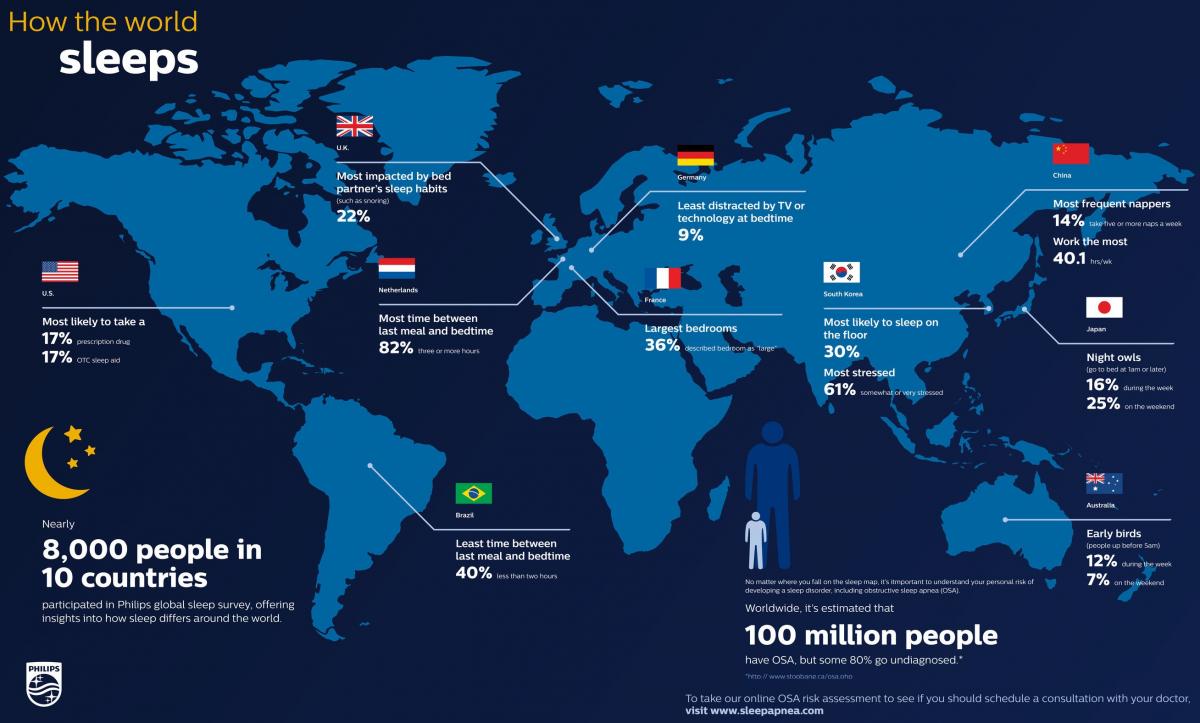ANXIETY over work, finances, and the economy are the leading factors causing sleep disturbance, according to a new report from Royal Philips. Although sleep is recognized globally as important to health and well-being, most people are not taking any steps to improve it, the report further revealed.
The "Sleep: A Global Perspective, " the first in a series of reports from Royal Philips, discusses sleep trends and habits based on a survey of approximately 8,000 people from the US, Brazil, the UK, France, the Netherlands, Germany, China, Japan, South Korea, and Australia. It was released in support of the World Association of Sleep Medicine's annual World Sleep Day.
Among a list of 13 factors that keep people up at night, work and financial/economic issues were the top sleep disruptors, selected by 25% and 28% of respondents, respectively. Only 21% of survey participants said technology was a sleep disruptor, although 67% admitted to sleeping with a mobile phone within reach.
According to Dr. Mark Aloia, senior director of Global Clinical Research, Philips, “Our report indicates how psychological factors can impact sleep, and how those factors can change depending on the times in which we live.”
Dr. Teofilo Lee-Chiong, M.D., chief medical liaison, Philips, added: “Over the past few years, many surveys have focused on the negative impact that technology and mobile devices can have on sleep, but our report confirmed that the global factors impacting people's sleep are much more varied and complex.”
South Korea, Brazil, and China ranked the highest among countries worried about work, with respective response shares of 43%, 33%, and 32%. Brazil (39%), Germany (31%), and the U.S. (31%) topped the list of countries most worried about economic and financial issues.
Further, survey results revealed that 96% of respondents consider sleep valuable. Sleep ranked the highest among a list of 12 different factors, including family, work, school, social life, and intimacy with a partner, that influence overall health and well-being with a 87% share. It is followed closely by money/financial security at 84%.
Only 17% reported consistently sleeping through the night, and 22% said they wake up before they would like five to seven nights a week. However, 57% admitted they have not taken any action to improve sleep.
Further, 6% of respondents reported having obstructive sleep apnea (OSA). This mirrors data from other reports indicating that more than 100 million people globally suffer from this disorder and about 80% of patients with OSA remain undiagnosed. A substantial number of people may benefit from proper screening, diagnosis, and treatment of sleep apnea.
According to Dr. Aloia, “Combating stress is critical to a good night's sleep, but the toughest part for people is often just getting motivated to make changes. These data further demonstrate that sleep needs to be viewed and treated holistically, with both technology and lifestyle solutions that work together to promote better health."
Dr. Lee-Chiong added, "While it's refreshing to see people around the world equally valuing sleep as critical to their overall health, there's clearly more that people can be doing to ensure they're on a path to a better night's sleep."
Air VaporMax Shoes
 iConnectHub
iConnectHub
 Login/Register
Login/Register Supplier Login
Supplier Login




























